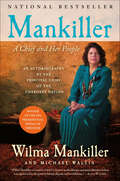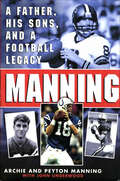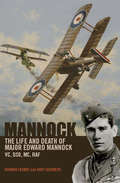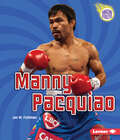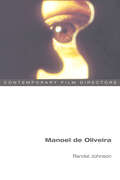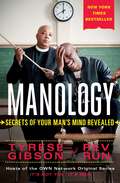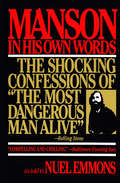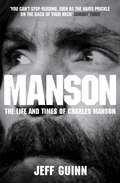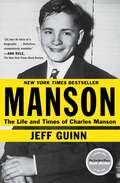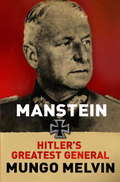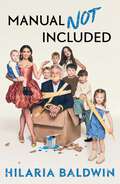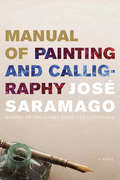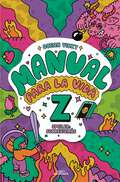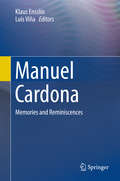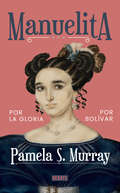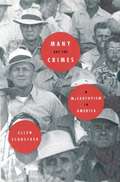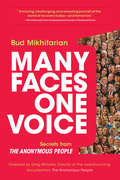- Table View
- List View
Mankiller: A Chief and Her People
by Michael Wallis Wilma MankillerWilma Mankiller has been the principal chief of the Cherokee Nation since 1985. She tells her personal story (her political awakening came during the 1970 occupation of Alcatraz Island), interwoven with the complex history of the Cherokee Nation. Annotation c. by Book News, Inc., Portland, Or.
Mankiller: A Chief and Her People
by Michael Wallis Wilma MankillerIn this spiritual, moving autobiography, Wilma Mankiller, former Chief of the Cherokee Nation and a recipient of the Presidential Medal of Freedom, tells of her own history while also honoring and recounting the history of the Cherokees. Mankiller's life unfolds against the backdrop of the dawning of the American Indian civil rights struggle, and her book becomes a quest to reclaim and preserve the great Native American values that form the foundation of our nation. Now featuring a new Afterword to the 2000 paperback reissue, this edition of Mankiller completely updates the author's private and public life after 1994 and explores the recent political struggles of the Cherokee Nation.
Manning: A Father, His Sons and a Football Legacy
by Peyton Manning Archie Manning John UnderwoodThe inspiring personal story of a family, an athletic tradition, and fifty years of a great all-American game.
Mannock: The Life and Death of Major Edward Mannock VC, DSO, MC, RAF
by Norman Franks Andy SaundersThe definitive biography of the WWI fighter pilot Edward &“Mick&” Mannock—and a revealing investigation into his mysterious fate. Although he was arguably the highest scoring RAF fighter pilot of the First World War, Edward &“Mick&” Mannock&’s life, particularly his death, is still shrouded in mystery. Did he achieve as many victories as are sometimes ascribed to him? How did he die? Where did he die? And more pertinently, where do his remains now lie? Investigative historians Norman Franks and Andy Saunders have assessed all the evidence and cut through the speculation to build a complete picture of the man and his achievements as a fighter pilot. Having unearthed much new and enlightening information, they present a truly balanced overview of his life—and also reveal for the first time exactly where he fell in battle a century ago. Includes photographs
Manny Pacquiao (Amazing Athletes Ser.)
by Jon M FishmanBoxer Manny Pacquiao has won multiple world championships and is the only fighter in the sport's history to win titles in eight different weight classes. When Manny fought Floyd Mayweather in 2015, many people called it the fight of the century. But Manny is much more than just a boxer. He is also a musician and an actor, and he has even played professional basketball. In 2010, Manny became a congressman in the Philippines. Learn more about the Filipino fighter who has taken the boxing world by storm.
Manoel de Oliveira (Contemporary Film Directors)
by Randal JohnsonUnderstanding the iconoclastic work of a lifelong cinematic pioneer Manoel de Oliveira's eighty-five year career made him a filmmaking icon and a cultural giant in his native Portugal. A lifelong cinematic pioneer, Oliveira merged distinctive formal techniques with philosophical treatments of universal themes--frustrated love, aging, nationhood, evil, and divine grace--in films that always moved against mainstream currents. Randal Johnson navigates Oliveira's massive feature film oeuvre. Locating the director's work within the broader context of Portuguese and European cinema, Johnson discusses historical and political influences on Oliveira's work, particularly Portugal's transformation from dictatorship to social democracy. He ranges from Oliveira's early concerns with cinematic specificity to hybrid discourses that suggest a tenuous line between film and theater on the one hand, and between fiction and documentary on the other. A rare English-language portrait of the director, Manoel de Oliveira invites students and scholars alike to explore the work of one of the cinema's greatest and most prolific artists.
Manology
by Tyrese Gibson Rev Run Chris MorrowTyrese Gibson, multiplatinum R&B singer and movie star, and Rev Run of Run DMC and star of Run's House present a bold , honest, and uncensored loo k into the male mind. Tyrese and Rev are unlikely best friends--Rev is married with six kids and Tyrese is a single dad still hesitant to settle down. But after an unexpected disagreement in which Rev insisted that marriage is forever, and Tyrese pushed that you could bail when the sex went bad, the two decided not just to agree to disagree but to team up and open their debate to a larger audience. Even though they're at different points in their journeys, both have clear insights on what it takes to make a relationship work and what can sink it instantly. Manology is a guide to regaining your relationship confidence and weeding out the cheaters, MANipulators, and pimps from the good men. Just follow Tyrese and Rev's advice and finally understand the reasons behind your man's actions. Some men's behavior can't be changed, but it's better to face the truth. No matter how painful or distressing that truth might be, if you know it, you can confront it and move past it. Tyrese and Rev acknowledge that it can be difficult for men to open up, but they present real strategies for men and women to have honest and open discussions about relationship expectations. With Rev's hard-earned knowledge on what it takes to make a marriage work, and Tyrese's sometimes uncomfortable but always straight talk on the single man's mind-set, Manology is your one true source of knowledge to help you take control of your love life and truly understand your man.
Manology
by Tyrese Gibson Rev Run Chris MorrowTyrese Gibson, multiplatinum R&B singer and movie star, and Rev Run of Run DMC and star of Run's House present a bold , honest, and uncensored loo k into the male mind. Tyrese and Rev are unlikely best friends--Rev is married with six kids and Tyrese is a single dad still hesitant to settle down. But after an unexpected disagreement in which Rev insisted that marriage is forever, and Tyrese pushed that you could bail when the sex went bad, the two decided not just to agree to disagree but to team up and open their debate to a larger audience. Even though they're at different points in their journeys, both have clear insights on what it takes to make a relationship work and what can sink it instantly. Manology is a guide to regaining your relationship confidence and weeding out the cheaters, MANipulators, and pimps from the good men. Just follow Tyrese and Rev's advice and finally understand the reasons behind your man's actions. Some men's behavior can't be changed, but it's better to face the truth. No matter how painful or distressing that truth might be, if you know it, you can confront it and move past it. Tyrese and Rev acknowledge that it can be difficult for men to open up, but they present real strategies for men and women to have honest and open discussions about relationship expectations. With Rev's hard-earned knowledge on what it takes to make a marriage work, and Tyrese's sometimes uncomfortable but always straight talk on the single man's mind-set, Manology is your one true source of knowledge to help you take control of your love life and truly understand your man.
Manology: Secrets of Your Man's Mind Revealed
by Tyrese Gibson Rev Run Chris MorrowTyrese Gibson, multiplatinum R&B singer and movie star, and Rev Run of Run DMC and star of Run's House present a bold , honest, and uncensored loo k into the male mind. Tyrese and Rev are unlikely best friends--Rev is married with six kids and Tyrese is a single dad still hesitant to settle down. But after an unexpected disagreement in which Rev insisted that marriage is forever, and Tyrese pushed that you could bail when the sex went bad, the two decided not just to agree to disagree but to team up and open their debate to a larger audience. Even though they're at different points in their journeys, both have clear insights on what it takes to make a relationship work and what can sink it instantly. Manology is a guide to regaining your relationship confidence and weeding out the cheaters, MANipulators, and pimps from the good men. Just follow Tyrese and Rev's advice and finally understand the reasons behind your man's actions. Some men's behavior can't be changed, but it's better to face the truth. No matter how painful or distressing that truth might be, if you know it, you can confront it and move past it. Tyrese and Rev acknowledge that it can be difficult for men to open up, but they present real strategies for men and women to have honest and open discussions about relationship expectations. With Rev's hard-earned knowledge on what it takes to make a marriage work, and Tyrese's sometimes uncomfortable but always straight talk on the single man's mind-set, Manology is your one true source of knowledge to help you take control of your love life and truly understand your man.
Manson in His Own Words: In His Own Words
by Charles Manson&“Gives us a portrait close to the truth&” of the man responsible for the Tate-LaBianca murders that changed Hollywood and ended the sixties (The New York Times Book Review). This astonishing book lays bare the life and the mind of a man whose acts have left us horrified. His story provides an enormous amount of new information about his life and how it led to the Tate-LaBianca murders and reminds us of the complexity of the human condition. Born in the middle of the Depression to an unmarried fifteen-year-old, Manson lived through a bewildering succession of changing homes and substitute parents, until his mother finally asked the state authorities to assume his care when he was twelve. Regimented and often brutalized in juvenile homes, Manson became immersed in a life of petty theft, pimping, jail terms, and court appearances that culminated in seven years of prison. Released in 1967, he suddenly found himself in the world of hippies and flower children, a world that not only accepted him, but even glorified his anti-establishment values. It was a combination that led, for reasons only Charles Manson can fully explain, to tragedy. Manson&’s story, distilled from seven years of interviews and examinations of his correspondence, provides sobering insight into the making of a criminal mind, and a fascinating picture of the last years of the sixties. &“A glimpse of part of the American experience that is rarely described from the inside . . . It compels both interest and horror.&”—The Washington Post &“Provides a fascinating glimpse into the mind of a truly dangerous human being.&”—Los Angeles Herald Examiner
Manson: The Life And Times Of Charles Manson
by Jeff GuinnAfter more than forty years, Charles Manson continues to mystify and fascinate us. One of the most notorious criminals in American history, Manson and members of his mostly female commune killed nine people, including pregnant actress Sharon Tate. Now, drawing on new information, bestselling author Jeff Guinn tells the definitive story of how this ordinary delinquent became a murderer. Manson helps us understand what obsessed him and, most terrifying of all, how he managed to persuade others to kill. Guinn interviewed Manson's sister and cousin, neither of whom has ever previously cooperated with an author. Childhood friends, cellmates, and even some members of the Manson Family have provided new information about Manson's life. Guinn has made discoveries about the night of the Tate murders, answering unresolved questions, such as why one person on the property was spared. There are even photographs of Manson's childhood and youth that have never previously been seen outside private family albums. Putting Manson in the context of his times, the turbulent end of the Sixties, Guinn shows how Manson represented the dark side of a generation. He came to Los Angeles hoping to get a recording contract, and the murders were directly related to his musical ambitions, although he cloaked them in a bizarre race-war theory. He was, in the words of one person who knew him, just like many other rock star wannabes-except that he was a killer.
Manson: The Life and Times of Charles Manson
by Jeff GuinnThe New York Times bestselling, authoritative account of the life of Charles Manson, filled with surprising new information and previously unpublished photographs: &“A riveting, almost Dickensian narrative…four stars&” (People).More than forty years ago Charles Manson and his mostly female commune killed nine people, among them the pregnant actress Sharon Tate. It was the culmination of a criminal career that author Jeff Guinn traces back to Manson’s childhood. Guinn interviewed Manson’s sister and cousin, neither of whom had ever previously cooperated with an author. Childhood friends, cellmates, and even some members of the Manson family have provided new information about Manson’s life. Guinn has made discoveries about the night of the Tate murders, answering unresolved questions, such as why one person near the scene of the crime was spared. Manson puts the killer in the context of the turbulent late sixties, an era of race riots and street protests when authority in all its forms was under siege. Guinn shows us how Manson created and refined his message to fit the times, persuading confused young women (and a few men) that he had the solutions to their problems. At the same time he used them to pursue his long-standing musical ambitions. His frustrated ambitions, combined with his bizarre race-war obsession, would have lethal consequences. Guinn’s book is a “tour de force of a biography…Manson stands as a definitive work: important for students of criminology, human behavior, popular culture, music, psychopathology, and sociopathology…and compulsively readable” (Ann Rule, The New York Times Book Review).
Manstein: Hitler's Greatest General
by Major General Mungo Melvin OBEThe first proper biography of Germany's most controversial military hero.The story of the military genius Field Marshal Erich von Manstein chronicles the misguided generation of German generals in the Second World War who claimed they fought for Germany, not for Hitler and National Socialism. The polished, urbane von Manstein was no uncouth Nazi. He persuaded the British writer Liddell Hart to assist in organising his defence during his war crimes trial at Hamburg in 1949. Sentenced to 18 years' imprisonment, he was released after three and then advised the West German government in raising its new army in the 1950s.Manstein was the mastermind who created the plan for the 1940 blitzkrieg that overran France in just six weeks. He played a key role in the invasion of Russia and conquered the Crimea, but failed to rescue the doomed Sixth Army at Stalingrad, his most controversial campaign. Three months after the inevitable failure there, he inflicted a massive defeat on the Red Army at Kharkov in a brilliantly designed counter-attack: a battle that has been studied in military academies ever since.Major-General Mungo Melvin speaks good German and knows Germany well. He has been assisted by the Manstein family, has delved deeply into the military archives and studied many of Manstein's battlefields close at hand. His book is much more than a biography of an extraordinary soldier: it describes the dilemmas encountered on operations and highlights the enduring tensions between senior military commanders and their political leaders in the prosecution of strategy.In Germany today, Manstein has become a symbol of the moral corruption of the Wehrmacht, whose commanders' actions enabled Hitler to prosecute a devastating war of conquest and perpetrate the Holocaust. This book reveals the true story of Hitler and his greatest general.
Manstein: Hitler's Greatest General
by Mungo MelvinThe first proper biography of Germany's most controversial military hero.The story of the military genius Field Marshal Erich von Manstein chronicles the misguided generation of German generals in the Second World War who claimed they fought for Germany, not for Hitler and National Socialism. The polished, urbane von Manstein was no uncouth Nazi. He persuaded the British writer Liddell Hart to assist in organising his defence during his war crimes trial at Hamburg in 1949. Sentenced to 18 years' imprisonment, he was released after three and then advised the West German government in raising its new army in the 1950s.Manstein was the mastermind who created the plan for the 1940 blitzkrieg that overran France in just six weeks. He played a key role in the invasion of Russia and conquered the Crimea, but failed to rescue the doomed Sixth Army at Stalingrad, his most controversial campaign. Three months after the inevitable failure there, he inflicted a massive defeat on the Red Army at Kharkov in a brilliantly designed counter-attack: a battle that has been studied in military academies ever since.Major-General Mungo Melvin speaks good German and knows Germany well. He has been assisted by the Manstein family, has delved deeply into the military archives and studied many of Manstein's battlefields close at hand. His book is much more than a biography of an extraordinary soldier: it describes the dilemmas encountered on operations and highlights the enduring tensions between senior military commanders and their political leaders in the prosecution of strategy.In Germany today, Manstein has become a symbol of the moral corruption of the Wehrmacht, whose commanders' actions enabled Hitler to prosecute a devastating war of conquest and perpetrate the Holocaust. This book reveals the true story of Hitler and his greatest general.
Manu. El cielo con las manos: Edición ampliada y actualizada
by Daniel FrescóRelato apasionante y exhaustivo, pleno de anécdotas que revela aspectos desconocidos de Ginóbili: la vocación casi genética por el básquet, la obsesión por crecer y la audacia por alcanzar un destino para el que se sabía predestinado. La fuerza de voluntad, la decisión inconmovible de triunfar, el talento, la inteligencia y una rara habilidad para llegar al lugar indicado en el momento justo confluyeron para dar forma al destino singular de Emanuel Ginóbili, el más grande jugador de básquet de la Argentina de todos los tiempos y uno de los mejores del mundo. El escritor y periodista Daniel Frescó reconstruye esa vida única mediante una minuciosa investigación que incluye testimonios de familiares, amigos y compañeros, desde la llegada de su bisabuelo a Bahía Blanca, la integración y desarrollo de su familia en la ciudad, y su infancia hasta la consagración en el básquet mundial con la obtención de la medalla de oro en los Juegos Olímpicos de Grecia y cuatro anillos de la NBA. El resultado de esta investigación demuestra que la forja de una personalidad como la de Manu no es producto del azar o la buena fortuna sino de la tenacidad individual, de sus orígenes, de un entorno, de un momento y hasta de un país. Su ascenso es el paradigma del argentino que conquista el mundo pero detrás de la imagen pública se esconde una persona humilde, fiel a sus afectos y dispuesto a superar todos los contratiempos a fuerza de inteligencia y constancia. Este relato apasionante y exhaustivo, pleno de anécdotas, revela aspectos desconocidos de Ginóbili: la vocación casi genética por el básquet, la obsesión por crecer y la audacia para alcanzar un objetivo para el cual, de algún modo, se sabía predestinado. Manu. El cielo con las manos, el primer y más completo libro sobre Emanuel Ginóbili, entrega el retrato preciso de una vida y de una carrera cuyos éxitos trascienden los límites del deporte. A trece años de su publicación y cuando Manu transita el retiro de la actividad, se impone una edición definitiva no simplemente para explicar su trayectoria o sus triunfos sino para realizar una proyección de un legado, que ya es tan o más impactante que sus logros, e imaginar el devenir de su futuro. Grandes estrellas y leyendas de la NBA; entrenadores de altísimo nivel; compañeros y excompañeros de los Spurs y la Selección Argentina; los jóvenes basquetbolistas que toman su bandera; atletas que compartieron con él Juegos Olímpicos; referentes nacionales e internacionales de otros deportes y actividades terminan de redondear con valiosísimos conceptos la trascendencia de su figura. Todo ello para completar un libro que abarca generaciones, atraviesa los siglos XX y XXI, y muestra al Manu íntegro que delinea un inmenso legado que perdurará por siempre. «Es un campeón, un gran competidor y uno de los mejores Spurs. Fue muy divertido jugar contra él todos estos años.»LeBron James «Manu será recordado por siempre.»Lionel Messi «Conservó ese fuego interno y ese deseo interior de seguir ganando.»Roger Federer «Su carrera nos dice a todos que se puede.»Jorge Valdano «Es un campeón. Soy fan de Manu. Quisiera saber dónde está esa fuente de la juventud.»Stephen Curry
Manual Not Included
by Hilaria BaldwinIn thoughtful, candid, and often funny vignettes, Hilaria Baldwin—mother, wellness expert, and star of TLC&’s The Baldwins—reveals the highs and lows and unpredictable outtakes from her different and not-so-different life.There&’s no set of instructions when it comes to navigating the challenges life throws at us. However, by sharing our narratives and finding our commonality, we can better deal with what comes our way. After meeting her husband, actor Alec Baldwin, Hilaria found joy and purpose entering the public eye, where she sought to build community and connection with others. She also faced the challenges of the uglier, more toxic parts of the spotlight, living under a warped magnifying glass. Through the ups and downs, Hilaria leaned into wisdom and support offered by others, learning that optimism, kindness, and a sense of humor can put life into perspective. And additionally learning that we are not alone, that we are more alike than we are different. In Manual Not Included, Hilaria writes about the relatable, hard-earned insights she&’s gained from her experiences as an individual, a partner, and a parent—from feeling empowered, to having a fulfilling relationship, to being as good a mother as possible, all while still being a work in progress. Within chapters about love, motherhood, and friendship, Hilaria offers up her candid stories around common themes facing women—from feeling like you&’re too much and also not enough, to grappling with the expectation to be a &“good girl,&” and to striving for unattainable perfection. While there is no one right way to live, by sharing what we&’ve learned along the way, with compassion and without judgment, we can each create our own perfectly imperfect manual.
Manual of Painting and Calligraphy: A Novel
by José SaramagoA disgruntled portrait artist in 1970s Portugal turn to writing in the Nobel Prize-winning author’s debut novel, now available in English translation.Manual of Painting and Calligraphy was José Saramago’s first novel. Written eight years before the critically acclaimed Baltasar and Blimunda, it is a story of self-discovery set in Portugal during the last years of Antonio Salazar’s dictatorship. It tells the story of a struggling artist who is commissioned to paint a portrait of an influential industrialist.Disheartened by his squandered talent, the artist soon undergoes a creative and political awakening when he discovers the possibilities of writing. The brilliant juxtaposition of a passionate love story and the crisis of a nation foreshadows the themes of Saramago’s major works.
Manual para la vida Z
by Ocean VickyOcean Vicky, una de las voces más potentes de la generación Z, nos comparte sus secretos para enfrentarse a la vida con humor y valentía. Cuando nacemos, nos plantan en esto que llaman «la Vida» y nos dicen: «Venga, tira para delante». Lo que no nos dicen es que la Vida está llena de mierdas. Ni que cada Mierda es como un Malo Final. Un bicho feo y terrorífico que pretenden que derrotes. Tú, que no tienes ni pajolera idea de qué va la vaina. Pero no te preocupes, que aquí es donde entro yo. Yo, que sé que pedir ayuda no solo no es un Malo, sino que es muy necesario, te he escrito un manual. Algo así como el de las instrucciones del frigorífico, pero más útil y menos peñazo. Nivel a nivel, te voy a transmitir todo el conocimiento que he podido recabar, las técnicas que he utilizado yo para superar cada final boss. Tú, el o la protagonista del videojuego, eres una persona normal y, como todo el mundo, tienes tus cosillas, pero eso no importa ahora mismo. Porque en este libro te vas a convertir en un/a héroe/heroína: codo con codo, aprenderemos a luchar contra todos los monstruos. Básicamente, te voy a enseñar a pasarte la vida a la manera de la Vicky. Abróchense los cinturones, que empieza el viaje.
Manuel Cardona
by Klaus Ensslin Luis ViñaThis book pays tribute to an extraordinary researcher and personality, Manuel Cardona. He had significant influence in the development of science and inside the scientific community. The book consists of contributions by former collaborators and students of Prof. Manuel Cardona. The short contributions deal with personal encounters with Manuel Cardona describing his extraordinary personality. This includes descriptions of scientific discussions, Manuel Cardona's involvement in social justice and his enormous knowledge about human culture, languages and history.
Manuel Puig and the Spider Woman: His Life and Fiction
by Suzanne Jill LevineManuel Puig & The Spider Woman tells the life story of the innovative and flamboyant novelist and playwright himself. Suzanne Jill Levine, his principal English translator, draws upon years of friendship as well as copious research and interviews in her remarkable book, the first biography of the inimitable writer. Manuel Puig (1932-1990), Argentinian author of Kiss of the Spider Woman and pioneer of high camp, stands alone in the pantheon of contemporary Latin American literature. Strongly influenced by Hollywood films of the thirties and forties, his many-layered novels and plays integrate serious fiction and popular culture, mixing political and sexual themes with B-movie scenarios. When his first two novels were published in the late 1960s, they delighted the public but were dismissed as frivolous by the leftist intellectuals of the Boom; his third novel was banned by the Peronist government for irreverence. His influence was already felt, though-even by writers who had dismissed him-and by the time the film version of Kiss of the Spider Woman became a worldwide hit, he was a renowned literary figure.Puig's way of life was as unconventional as his fiction: he spoke of himself in the female form in Spanish, renamed his friends for his favorite movie stars, referred to his young male devotees as "daughters," and, as a perennial expatriate, lived (often with his mother) everywhere from Rome to Rio de Janeiro.
Manuelita
by Pamela MurrayUna biografía sobre esta gran mujer. Manuelita Sáenz (1797-1856) fue ignorada por la mayoría de los historiadores profesionales, cuyos sesgos de género la relegaron a un papel menor. Chica mala, loca, indecente y hasta ninfómana son algunos de los calificativos que ha usado la historia oficial para definirla. Pero su vida fue la de una mujer decidida, que intervino el mundo militar y de la política, entonces reservado a los hombres. Incómoda para muchos, Manuelita regresa en este dedicado trabajo de investigación que sigue sus pasos en Perú, Ecuador y Colombia. En su brillante biografía, Murray presenta a Manuelita como una de las más grandes figuras femeninas del hemisferio, precursora de una nueva revolución en América Latina: la emancipación e igualdad de las mujeres.
Many Are the Crimes
by Ellen SchreckerIt all seems like so much ancient history -- the "red scare", black lists; even Senator Mccarthy. Yet, in truth, the so-called "Mccarthy period" -- during which people were persecuted and investigated for what they thought -- is one of the most shameful periods of our history. In her book, ellen Schrecker takes a hard look at this phenomenon and draws some sobering conclusions. If you love freedom and liberty and feel that all of us need to work to keep it safe -- from the right and the left -- this book is a must read. And, lest you think this is ancient history, think about some of the hysterical sexual abuse trials of the eighties and nineties. From whence will the next danger come?
Many Faces, One Voice: Secrets from The Anonymous People
by Bud Mikhitarian Greg WilliamsMany Faces, One Voice is a must-read companion book to the award-winning film The Anonymous People.<P><P> Together with the film, this collection of insights, illuminated by vibrant faces and voices of recovery, takes the reader along a journey of individual growth and, potentially, to world change.A vital record of the lives and testimony of brave people who have come out of the shadows of anonymity to fight stigma and discrimination--people who now publicly advocate for the 23 million Americans suffering with addiction. Their inspiring stories, told in intimate detail, are essential to understanding the success, the hope, and the power of recovery.Bud Mikhitarian is an award-winning filmmaker and the producer of The Anonymous People film.Greg Williams is the director of The Anonymous People.
Many Forms of Madness: A Family's Struggle with Mental Illness and the Mental Health System
by Rosemary Radford RuetherIn telling the story of her son's thirty-year struggle with schizophrenia, the author lays bare the inhumane treatment throughout the history of people with mental illness. Despite countless reforms by "idealistic reformers" and an enlightened understanding that mental illness is a physical disease like any other, conditions for people who struggle with mental illness are little improved. She asks why this is so and then goes on to imagine what we would do for people with mental illness "if we really cared."

